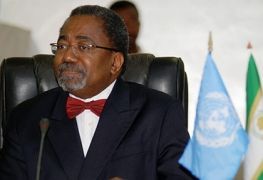Sudan, Darfur peacekeeping mission agree rules of operation
February 9, 2008 (KHARTOUM) — Sudan and the African Union-United Nations peacekeeping mission for Darfur signed an agreement on Saturday determining how the joint force will operate, capping weeks of drawn-out negotiations.

The Status of Forces Agreement was signed in a ceremony in Khartoum by Foreign Minister Deng Alor and the head of the UNAMID force, Rodolphe Adada.
It sets out the legal framework for the mission to operate in Sudan and the western region of Darfur, where at least 200,000 people have died and more than two million have fled their homes since rebellion broke out five years ago.
The signing should allow the mission — comprising only 9,000 personnel of the 26,000 ultimately envisaged — to become fully operational.
The agreement deals with UNAMID funds, property, communications facilities, the freedom of movement of its personnel, their safety and security, privileges and immunities, entry into, and exit from Sudan.
Adada described the agreement as “an important milestone” in the deployment of UNAMID in war-torn Darfur, expressing the hope that its negotiations will serve as a model for future cooperation between UNAMID and Sudan.
“As a government, we have the responsibility to protect our people,” Alor said, describing the agreement as the beginning of an endeavour by both parties to help the people of Darfur “who have suffered a lot.”
The United Nations has long called on Khartoum to accept non-African contingents of UNAMID, facilitate access to land and water as necessary, grant flight clearances and issue visas without undue delay to UNAMID personnel.
Asked at the ceremony about the participation of non-African troops, the Sudanese foreign minister said: “The forces will be predominantly African”.
“We are committed to deploying non-African forces as we go along, in consultation with UNAMID,” he added.
The AU-UN mission took over peacekeeping efforts in Darfur following a largely symbolic ceremony on December 31, replacing a now defunct AU mission which had failed to stem the conflict.
The Security Council authorised UNAMID in July but its short life has been blighted by accusations that Khartoum has been stalling and that contributing countries are not supplying enough hardware, in particular helicopters.
When it reaches full capacity, UNAMID will be the UN’s largest peacekeeping operation, deployed five years after ethnic minority rebels took up arms against Sudan’s Arab-dominated regime in February 2003.
(AFP)
